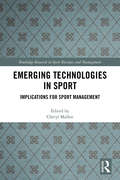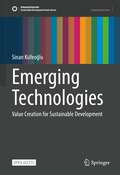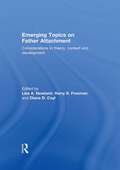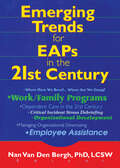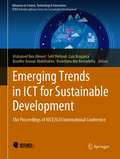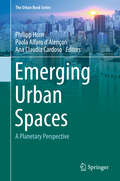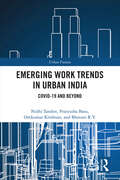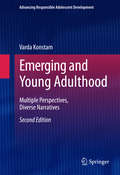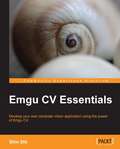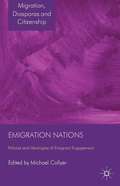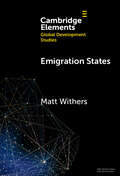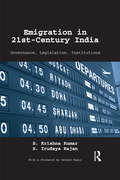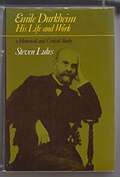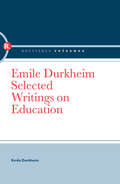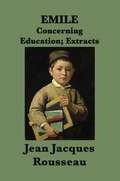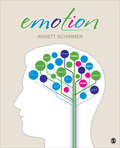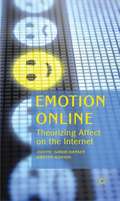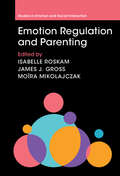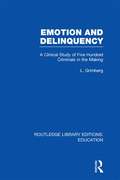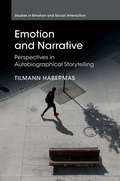- Table View
- List View
Emerging Technologies in Sport: Implications for Sport Management (Routledge Research in Sport Business and Management)
by Cheryl MallenAdvances in technology have always had a significant impact on sport. This book surveys the next generation of emerging technologies and considers how sport managers, governing bodies and officials can meet the challenges that they pose for sport competition, participation and events. It explores cutting edge developments in areas such as gene doping, vision and brain technologies, 3D printing technologies, molecular communication technologies and our ability to "rebuild" bodies. Each chapter considers the implications of a particular technology in terms of ethics, rules and regulations, facilities and resourcing, as well as the emergence of completely new forms of sport, and offers strategies for future sport management. Emerging Technologies in Sport is a valuable resource for sport industry professionals, undergraduate students in the fields of sport management, sport tourism, and sport business, and a fascinating read for anyone with an interest in sport and future applications of emerging technologies within sport.
Emerging Technologies: Value Creation for Sustainable Development (Sustainable Development Goals Series)
by Sinan KüfeoğluThis monograph investigates a multitude of emerging technologies including 3D printing, 5G, blockchain, and many more to assess their potential for use to further humanity’s shared goal of sustainable development. Through case studies detailing how these technologies are already being used at companies worldwide, author Sinan Küfeoğlu explores how emerging technologies can be used to enhance progress toward each of the seventeen United Nations Sustainable Development Goals and to guarantee economic growth even in the face of challenges such as climate change. To assemble this book, the author explored the business models of 650 companies in order to demonstrate how innovations can be converted into value to support sustainable development. To ensure practical application, only technologies currently on the market and in use actual companies were investigated. This volume will be of great use to academics, policymakers, innovators at the forefront of green business, and anyone else who is interested in novel and innovative business models and how they could help to achieve the Sustainable Development Goals. This is an open access book.
Emerging Topics on Father Attachment: Considerations in Theory, Context and Development
by Lisa A. Newland, Harry S. Freeman and Diana D. CoylThis book is the first of its kind to focus specifically on children’s attachment to fathers, and explores the connections among fathering, family dynamics, and attachment relationships. It includes theoretical, methodological and research reports written by an interdisciplinary group of researchers from around the globe. The purpose of this book is to familiarize the reader with the conceptualization, measurement and provisions of the attachment bond between children and their fathers, from infancy through young adulthood and across diverse individual, family, community, and cultural systems. Recent empirical findings suggest that new methods of measuring child-father attachment are warranted, and that attachment to fathers may be unique from, but complementary to attachment to mothers. These findings also suggest that attachment to fathers uniquely predicts children’s healthy developmental outcomes, and these findings are robust across various contexts, but these predictive relationships are best understood within context.This book provides a summary of current scholarly knowledge of fathering and attachment, and describes future directions to be explored by professionals, policy makers and practitioners within family services, education, and social work settings. It is also of interest to the general public. This book was published as a special issue of Early Child Development and Care.
Emerging Trends for EAPs in the 21st Century
by Nan Van Den BerghRaise your organization's productivity and morale with the proper EAPs!The development of employee assistance programs (EAPs) was one of the 20th century's most important workplace innovations. Emerging Trends for EAPs in the 21st Century examines the evolution of EAPs from their origin as a way of dealing with alcoholic employees to the multifaceted EAPs in the modern workplace. Today's EAPs serve employees affected by a great number of stressors related to the rapidly changing environment of today's workplaces as well as stressors related to the balancing of work and family issues.Emerging Trends for EAPs in the 21st Century stresses the important advantages to be found in working from a strengths and solution-oriented case management approach, rather than an assessment and referral model, and of considering individuals “challenged” rather than “troubled.” Thus, you will learn that trauma and abuse, illness and struggle may be injurious, but they also may be sources of challenge and opportunity, and you'll see that every individual, couple, family, group, organization, and community has strengths that can be fortified to help those who need it.Emerging Trends for EAPs in the 21st Century will show you: the impact of today's changing workforce demography the need for workplace-sponsored services to assist caregivers and older workers sophisticated intervention skills that organizations are using to help manage crisis, change, and evolution today new ways of providing help to your employees. . . and bring you stimulating discussions and examinations of: child/elder/dependent care services prevention/interventions for older workers work/family programs critical incident interventions management consultation health and wellness promotionEmerging Trends for EAPs in the 21st Century offers insightful commentary, pragmatic information, and predictions for the future of employee assistance programs as we move into the 21st century.
Emerging Trends in ICT for Sustainable Development: The Proceedings of NICE2020 International Conference (Advances in Science, Technology & Innovation)
by Mohamed Ben Ahmed Sehl Mellouli Luis Braganca Boudhir Anouar Abdelhakim Kwintiana Ane BernadettaThis book features original research and recent advances in ICT fields related to sustainable development. Based the International Conference on Networks, Intelligent systems, Computing & Environmental Informatics for Sustainable Development, held in Marrakech in April 2020, it features peer-reviewed chapters authored by prominent researchers from around the globe. As such it is an invaluable resource for courses in computer science, electrical engineering and urban sciences for sustainable development. This book covered topics including• Green Networks • Artificial Intelligence for Sustainability• Environment Informatics• Computing Technologies
Emerging Urban Spaces: A Planetary Perspective (The Urban Book Series)
by Philipp Horn Paola Alfaro D’Alençon Ana Claudia CardosoThis edited collection critically discusses the relevance of, and the potential for identifying conceptual common ground between dominant urban theory projects – namely Neo-Marxian accounts on planetary urbanization and alternative ‘Southern’ post-colonial and post-structuralist projects. Its main objective is to combine different urban knowledge to support and inspire an integrative research approach and a conceptual vocabulary which allows understanding the complex characteristics of diverse emerging urban spaces. Drawing on in-depth case study material from across the world, the different chapters in this volume disentangle planetary urbanization and apply it as a research framework to the context-specific challenges faced by many `ordinary' urban settings. In addition, through their focus on both Northern- and Southern urban spaces, this edited collection creates a truly global perspective on crucial practice-relevant topics such as the co-production of urban spaces, the ‘right to diversity’ and the ‘right to the urban’ in particular local settings.
Emerging Work Trends in Urban India: COVID-19 and Beyond (Urban Futures)
by Nidhi Tandon Pratyusha Basu Omkumar Krishnan Bhavani R.V.This book offers an overview of India’s emerging digital economy and the resulting challenges and opportunities for urban workplaces. It examines contemporary economic and social transformations in India by focusing on how new technologies and policies are shaping urban work practices and patterns. The book emphasizes inclusive and equitable practices that consider the needs of the formal and informal sector workforce as essential to India’s urban development. Drawing on cross-disciplinary frameworks, it examines key issues related to work trends in the Indian urban economy and its digital landscapes, including Industry 4.0 and technology–labour nexus, smart cities and innovation, urbanism and consumerism, workplace transitions such as service industry and remote work, digital divide, skill development initiatives, and the impact of socio-economic inequalities and disruptions. The authors provide perspectives on the digital future of urban work in India and other emerging economies in the post-COVID-19 phase, and underscore the importance of enacting balanced policies, remodelling institutions, and equipping the labour force for adapting to new demands related to future employability and investments. This book will interest students, teachers, and researchers of urban studies, urban sociology, sociology of work, labour studies, human and urban geography, economic geography, urban economics, development studies, urban development and planning, public policy, regional planning, politics of urban development, social and cultural change, urban sustainability, environmental studies, management studies, South Asian Studies, and Global South studies. It will also be useful to policymakers, non-governmental organizations, activists, and those interested in India and the future of the global economy.
Emerging and Young Adulthood
by Varda KonstamThe most distinctive feature of the Second Edition is its theoretical orientation coupled with a focus on understanding emerging and young adulthood from multiple perspectives. The updated and expanded book offers readers an opportunity to "listen to the voices" of emerging and young adults, parents, and employers, which is key to understanding this particular developmental period. In addition, the case studies provided throughout the book are diverse and detailed. The issues of emerging adulthood are complicated, nuanced, and defy easy characterizations. This book provides an opportunity to debunk many established pernicious stereotypes about emerging and young adults. The presentation of diverse voices and case material serves as a springboard for discussion and engages readers with material depicting emerging adults in the throes of working through developmental challenges characteristic of this period. In addition, the recent economic downturn has created havoc and further instability in the lives of emerging and young adults. The Second Edition focuses on the effects of - as well as possible solutions to - unemployment on emerging and young adults. A new chapter focuses on career experimentation versus career floundering, which is an important distinction. Additional new chapters address the effects of technology as well as depression and anxiety on emerging and young adults. The Second Edition examines emerging and young adulthood within a larger developmental and ecological context. In addition, it ensures that readers are well positioned to understand how the developmental demands of this period intersect with current economic, social, and political realities. It is a must-have resource for developmental, clinical child and school psychologists, rehabilitation counselors and therapists, I/O psychologists, and sociologists as well as for researchers and graduate-level students across these various disciplines.
Emgu CV Essentials
by Shin ShiThis book provides a practical guide to Emgu CV libraries, with sample code and examples used throughout to explain the concepts clearly. Each chapter deals with a different aspect of the Computer Vision field and the implementation of that topic in Emgu CV.If you are a C# programmer working on computer vision projects, this book is for you. You should have prior experience with C#.
Emigration Nations
by Michael CollyerUntil very recently emigrants were considered an embarrassment, an irritation or an irrelevance by most states. The long experience of emigrant engagement in certain historical emigration countries, such as Italy, was very much the exception. Since about 2000, countries around the world have shown much greater enthusiasm for policies to encourage the loyalty of nationals who have made a permanent home elsewhere. These developments have changed the relationship between state institutions and emigrant nationals. Policies of emigrant engagement also challenge fundamental understandings about the nature of political society in the modern era; the notion of states as territorial institutions or the understanding of citizenship as membership in a territorially bounded polity are both undermined. This book provides copious evidence of this process, with detailed, comparable case studies of twelve countries and a new theoretical framework that helps explain changing policies towards emigrants.
Emigration States: Migration-Development Policymaking in the Asia-Pacific (Elements in Global Development Studies)
by Matt WithersGuestworker migration has become an increasingly prominent feature within the economic landscape of the Asia-Pacific. Longstanding regional disparities have underscored the emergence of fragile remittance economies where a structural reliance on labour-export has offered an unsustainable 'fix' for stubborn developmental challenges. Combining political-economic and Foucauldian frames of analysis, this Element reconciles the macroeconomic contradictions of remittance economies with the political logics bound up in emigration policymaking, contending that new modalities of governance have emerged in the transition from developmental to emigration states. Comparing the policy histories of four diverse remittance economies in the region – Myanmar, the Philippines, Samoa, and Sri Lanka – it frames emigration policies as complex, inward-facing interventions that simultaneously promote and constrain mobility to address counterpoised economic and political pressures. Important variations are explored though the example of gendered migration bans, whereby emigration states have situated women's bodies as sites for resolving contextually specific social tensions accompanying labour-export.
Emigration in 21st-Century India: Governance, Legislation, Institutions
by S. Irudaya Rajan S. Krishna KumarEmigration in 21st-Century India is the first definitive exposition of contemporary Indian labour migration. The book provides a comprehensive appraisal of the policies, legislation and institutional architecture governing emigration at both federal and state levels. It posits that, geographically, emigration is now a more inclusive, pan-India phenomenon with many distinct features. It draws critical attention to the multiple dualities in Indian emigration, showing how the artificial distinction between a universal pravasi (‘expatriate’ or ‘migrant’) and a restricted aam pravasi (‘common emigrant’) distorts emigration governance. On the basis of extensive data from the Kerala Migration Survey (KMS) and National Sample Survey Organisation (NSSO) Rounds, it projects the emerging profile of the emigrant from new source states as also the likely number of migrants by 2021, drawing cross-country comparisons where appropriate. The work will be invaluable to scholars of migration and diaspora studies, economics, development studies and sociology, as well as policy makers, administrators, academics, and non-governmental organisations in the field.
Emile Durkheim on Institutional Analysis
by Emile Durkheim Mark TraugottRanging from Durkheim's original lecture in sociology to an excerpt from the work incomplete at his death, these selections illuminate his multiple approaches to the crucial concept of social solidarity and the study of institutions as diverse as the law, morality, and the family. Durkheim's focus on social solidarity convinced him that sociology must investigate the way that individual behavior itself is the product of social forces. As these writings make clear, Durkheim pursued his powerful model of sociology through many fields, eventually synthesizing both materialist and idealist viewpoints into his functionalist model of society.
Emile Durkheim: His Life And Work, A Historical And Critical Study
by Steven LukesThis study of Durkheim seeks to help the reader to achieve a historical understanding of his ideas and to form critical judgments about their value. To some extent these tow aims are contradictory. On the one hand, one seeks to what did Durkheim really mean, how did he see the world, how did his ideas related to one another and how did they develop, how did they related to their biographical and historical context, how were they received, what influence did they have and to what criticism were they subjected, what was it like not to make certain distinctions, not to see certain errors, of fact or of logic, not to know what has subsequently become known?On the other hand, one seeks to how valuable and how valid are the ideas, to what fruitful insights and explanations do they lead, how do they stand up to analysis and to the evidence, what is their present value? Yet it seems that it is only by inducing oneself not to see and only by seeing them that one can make a critical assessment. The only solution is to pursue both aims-seeing and not seeing-simultaneously. More particularly, this book has the primary object of achieving that sympathetic understanding without which no adequate critical assessment is possible. It is a study in intellectual history which is also intended as a contribution to sociological theory.
Emile Durkheim: Selected Writings
by Anthony GiddensThis is a collection of Durkheim's writings drawing upon the whole body of his work. Dr Giddens takes his selections from a wide variety of sources and includes a number of items from untranslated writings in the Revue Philosophique, Annee Sociologique and from L'evolution pedagogue en France. Selections from previously translated writings have been checked against the originals and amended or re-translated where necessary. Dr Giddens arranges his selections thematically rather than chronologically. However, extracts from all phases of Durkheim's intellectual career are represented, giving the date of their first publication, which makes the evolution of his thought easily traceable. In his introduction Dr Giddens discusses phases in the interpretation of Durkheim's thought, as well as the main themes in his work, with an analysis of the effects of his thinking on modern sociology. The book is for students at any level taking courses in sociology, social anthropology and social theory in which Durkheim is one of the major writers studied.
Emile Durkheim: Selected Writings on Education (Routledge Library Editions)
by W. S. F. PickeringEmile Durkheim is widely lauded as one of the founding fathers of modern Sociology and for his substantial contribution to the sociology of education. This set brings some of his most important writings on the subject together for the first time.
Emile Durkheim: Sociologist and Moralist
by Stephen P. TurnerInternational scholarship over the last twenty years has produced a new understanding of Emile Durkheim as a thinker. It has contributed to reassembling what, for Durkheim, was always a whole: a sociological selection on morals and moral activism. This volume presents an overview of Durkheim's thought and is representative of the best of contemporary Durkheim scholarship.
Emile or Concerning Education
by Jean Jacques Rousseauémile, or On Education is a treatise on the nature of education and on the nature of man written by Jean-Jacques Rousseau, who considered it to be the "best and most important of all my writings." Due to a section of the book entitled "Profession of Faith of the Savoyard Vicar," émile was banned in Paris and Geneva and was publicly burned in 1762. During the French Revolution, émile served as the inspiration for what became a new national system of education.
Eminent Economists II
by Michael Szenberg Lall B. RamrattanThe sequel to Eminent Economists, this book presents the ideas of some of the most outstanding economists of the past half century. The contributors, representing divergent points of the ideological compass, present their life philosophies and reflect on their conceptions of human nature, society, justice, and the source of creative impulse. These self-portraits reveal details of the economists' personal and professional lives that capture the significance of the total person. The essays represent streams of thought that lead to the vast ocean of economics, where gems of the discipline lie, and the volume will appeal to a wide array of readers, including professional economists, students, and laypersons who seek a window into the heart of this complex field. The contributors include Alan S. Blinder, Clair Brown, John Y. Campbell, Vincent P. Crawford, Paul Davidson, Angus Deaton, Harold Demsetz, Peter Diamond, Avinash Dixit, Barry Eichengreen, Jeffrey Frankel, Richard B. Freeman, Benjamin M. Friedman, John Hull, Michael D. Intriligator, Peter B. Kenen, Anne O. Krueger, Helen F. Ladd, Harry M. Markowitz, Frederic S. Mishkin, Elinor Ostrom, Anwar Shaikh, Jeremy J. Siegel, Vernon L. Smith, Robert M. Stern, Myra H. Strober, Hal R. Varian, Michelle J. White, and Marina V. N. Whitman.
Emotion
by Annett SchirmerEmotion is a comprehensive text that integrates traditional psychological theories and cutting-edge neuroscience research to explain the nature and role of emotions in human functioning. Written in an engaging style, the book explores emotions at the behavioral, physiological, mental, and neurofunctional (i.e., chemical, metabolic, and structural) levels, and examines each in a broad context, touching on different theoretical perspectives, regulatory processes, development, and culture, among others. Providing greater insight and depth than existing texts, the book offers a holistic view of the field, giving students a broader understanding of the mechanisms underlying emotions and enabling them to appreciate the role emotions play in their lives. In dedicated chapters, the text covers past and current theories of emotion, individual emotions and their bodily representation, the role of emotions for behavior and cognition, as well as interindividual differences.
Emotion
by Annett SchirmerEmotion is a comprehensive text that integrates traditional psychological theories and cutting-edge neuroscience research to explain the nature and role of emotions in human functioning. Written in an engaging style, the book explores emotions at the behavioral, physiological, mental, and neurofunctional (i.e., chemical, metabolic, and structural) levels, and examines each in a broad context, touching on different theoretical perspectives, regulatory processes, development, and culture, among others. Providing greater insight and depth than existing texts, the book offers a holistic view of the field, giving students a broader understanding of the mechanisms underlying emotions and enabling them to appreciate the role emotions play in their lives. In dedicated chapters, the text covers past and current theories of emotion, individual emotions and their bodily representation, the role of emotions for behavior and cognition, as well as interindividual differences.
Emotion Online
by Joanne Garde-HansenEmotion Online: Theorizing Affect on the Internet takes stock of where we are emotionally with regards to the Internet in social and cultural terms. Online users are switching between personal, national, international and global modes of being and feeling that shape private and public experiences. Drawing upon the well-established discipline of media studies, the book travels theoretically through, across, in and between examples of traditional media as they merge and emerge online. Garde-Hansen and Gorton explore how we feel about, and how we feel in, our online media ecology in the context of global media platforms.
Emotion Regulation and Parenting (Studies in Emotion and Social Interaction)
by James J. Gross Isabelle Roskam Moïra MikolajczakEmotion Regulation and Parenting provides a state-of-the-art account of research conducted on emotion regulation in parenting. After describing the conceptual foundations of parenthood and emotion regulation, the book reviews the influence of parents' emotion regulation on parenting, how and to what extent emotion regulation influences child development, cross-cultural perspectives on emotion regulation, and highlights current and future directions. Drawing on contributions from renowned experts from all over the world, chapters cover the most important topics at the intersection of parenting and emotion regulation. Essentials are explored, as well as current, topical, and controversial issues, pointing both to what is known and what requires further research. This title is part of the Flip it Open Programme and may also be available Open Access. Check our website Cambridge Core for details.
Emotion and Delinquency: A Clinical Study of Five Hundred Criminals in the Making (Routledge Library Editions: Education)
by L GrimbergInevitably a product of the time in which it was published this book discusses important questions of neuro-psychology as well as setting out the early ‘nature versus nurture’ debate. The author also argues for changes in the care and education of those with learning difficulties to enable them to lead fulfilling lives, rather than being incarcerated in institutions (as was routinely the case in 1928).
Emotion and Narrative: Perspectives in Autobiographical Storytelling (Studies in Emotion and Social Interaction)
by Tilmann HabermasEmotions have a life beyond the immediate eliciting situation, as they tend to be shared with others by putting the experience in narrative form. Narrating emotions helps us to express, understand, and share them: the way we tell stories influences how others react to our emotions, and impacts how we cope with emotions ourselves. In Emotion and Narrative, Habermas introduces the forms of oral narratives of personal experiences, and highlights a narrative's capacity to integrate various personal and temporal perspectives. Via theoretical proposals richly illustrated with oral narratives from clinical and non-clinical samples, he demonstrates how the form and variety of perspectives represented in stories strongly, yet unnoticeably, influence the emotional reactions of listeners. For instance, narrators defend themselves against negativity and undesired views of themselves by excluding perspectives from narratives. Habermas shows how parents can help children, and psychotherapists can assist patients, to enrich their narratives with additional perspectives.
